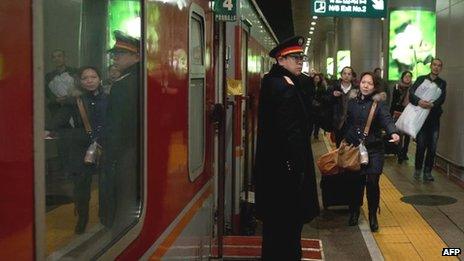China scraps railways ministry in streamlining drive
- Published

China's railway system has been slow to change
China has dissolved its powerful railways ministry in a raft of measures aimed at boosting government efficiency and tackling corruption.
The railways ministry, which has been criticised for fraud and wasting funds, now comes under the transport ministry.
The family planning commission, which oversees the controversial one-child policy, joins with the health ministry.
China is holding its National People's Congress, which will cement its once-in-a-decade leadership change.
Communist Party chief Xi Jinping will become president, replacing Hu Jintao, while Li Keqiang will replace Wen Jiabao as premier.
'Breach of duty'
In his work report, which opened the congress last week, Mr Wen promised stable growth, anti-corruption efforts and better welfare provision.
The latest streamlining of ministries reflects the public's and leadership's concern at corruption and the wasteful overlapping of bureaucracy.
State Council Secretary-General Ma Kai told the congress that "breach of duty, using positions for personal gain and corruption" had not been effectively tackled.
He said poor supervision had led to "work left undone or done messily".
Mr Ma said that overlapping of duties within various ministries had often led to officials passing the buck.
The streamlining abolishes four bodies and cuts the number of ministries by two to 25. The food and drug administration will become a fully fledged ministry, following a number of tainted product scandals.
The railways ministry has been slow to change.
Former railways minister Liu Zhijun was sacked in 2011 and is facing corruption charges.
The new structure will place construction and the management of services under the new China Railway Corp, while safety and regulation will come under the transport ministry.
It is unclear whether placing the family planning commission under the health ministry indicates a rethink of the one-child policy.
However, the Communist Party says it will continue to set policy on the issue, with family planning continuing "on the basis of stable and low birth rates".
A number of maritime agencies are to be pulled into a single administration as China faces rising disputes over sovereignty in the East and South China seas.
The National Oceanic Administration will have control over the coastguard forces, customs and fisheries enforcement.
The two media watchdogs, the General Administration of Press and Publication and the State Administration of Radio, Film and Television, will also be merged.
Around 3,000 delegates are attending the Congress, including members of the military, monks, ethnic minority representatives and business leaders. The majority are members of China's Communist Party.